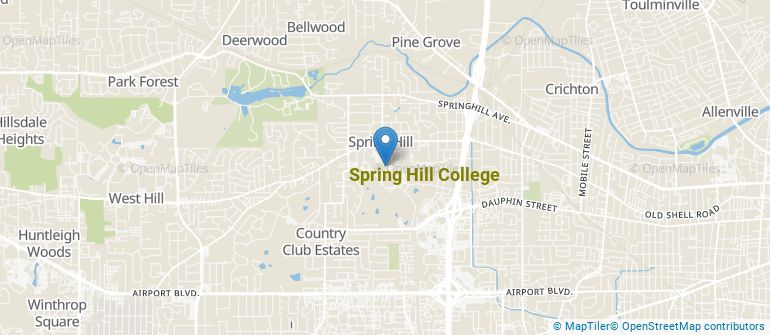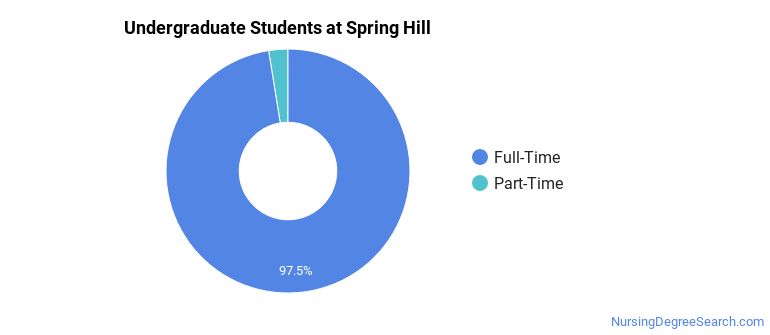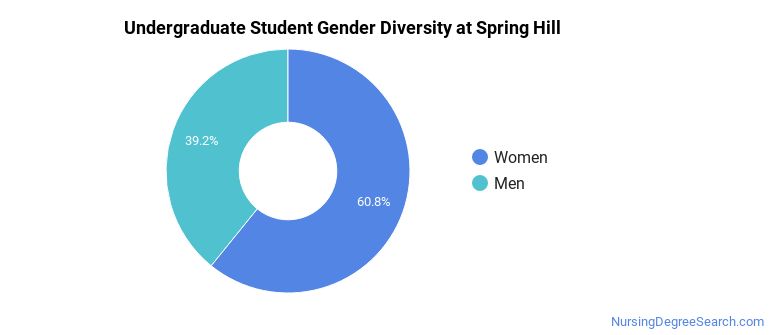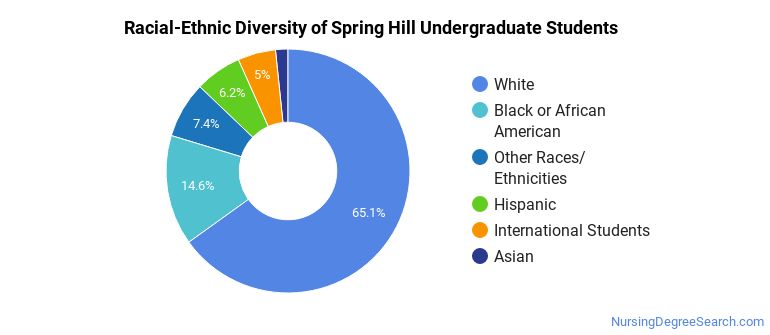Spring Hill College Nursing Programs
Located in Mobile, Alabama, Spring Hill College is a private not-for-profit institution. The location of Spring Hill is great for students who prefer living in an urban area.
Where Is Spring Hill College?

Contact details for Spring Hill are given below.
| Contact Details | |
|---|---|
| Address: | 4000 Dauphin St, Mobile, AL 36608-1780 |
| Phone: | 251-380-4000 |
| Website: | www.shc.edu |
How Do I Get Into Spring Hill?
You can apply to Spring Hill online at: https://www.shc.edu/admissions-aid/admissions/apply/
Admission Requirements for Spring Hill
| Submission | Required? |
|---|---|
| High School GPA | 1 |
| High School Rank | 3 |
| High School Transcript | 1 |
| College Prep Program | 5 |
| Recommendations | 5 |
| SAT or ACT Scores | 5 |
| TOEFL | 1 |
How Hard Is It To Get Into Spring Hill?
Approximately 38% of accepted students are men and 62% are women. The acceptance rate for men is 75%, and the acceptance rate for women is 71%.
Average Test Scores
About 3% of students accepted to Spring Hill submitted their SAT scores. When looking at the 25th through the 75th percentile, SAT Evidence-Based Reading and Writing scores ranged between 550 and 620. Math scores were between 560 and 610.
Can I Afford Spring Hill College?
The net price is calculated by adding tuition, room, board and other costs and subtracting financial aid.
Student Loan Debt
While almost two-thirds of students nationwide take out loans to pay for college, the percentage may be quite different for the school you plan on attending. At Spring Hill, approximately 56% of students took out student loans averaging $6,429 a year. That adds up to $25,716 over four years for those students.
Spring Hill College Undergraduate Student Diversity

There are also 130 graduate students at the school.
Gender Diversity
Of the 1,034 full-time undergraduates at Spring Hill, 39% are male and 61% are female.

Racial-Ethnic Diversity
The racial-ethnic breakdown of Spring Hill College students is as follows.

| Race/Ethnicity | Number of Grads |
|---|---|
| Asian | 17 |
| Black or African American | 151 |
| Hispanic or Latino | 64 |
| White | 673 |
| International Students | 52 |
| Other Races/Ethnicities | 77 |
Geographic Diversity
Alabama students aren't the only ones who study at Spring Hill College. At this time, 24 states are represented by the student population at the school.
Over 26 countries are represented at Spring Hill. The most popular countries sending students to the school are Germany, Belize, and Mexico.
Spring Hill College Nursing Concentrations
The table below shows the number of awards for each concentration.
| Major | Bachelor’s | Master’s | TOTAL |
|---|---|---|---|
| Registered Nursing | 13 | 0 | 13 |
| Clinical Nurse Leader | 0 | 1 | 1 |
| TOTAL | 13 | 1 | 14 |
References
*The racial-ethnic minorities count is calculated by taking the total number of students and subtracting white students, international students, and students whose race/ethnicity was unknown. This number is then divided by the total number of students at the school to obtain the racial-ethnic minorities percentage.
- College Factual
- National Center for Education Statistics
- Image Credit: By Rlm0710 under License
More about our data sources and methodologies.
